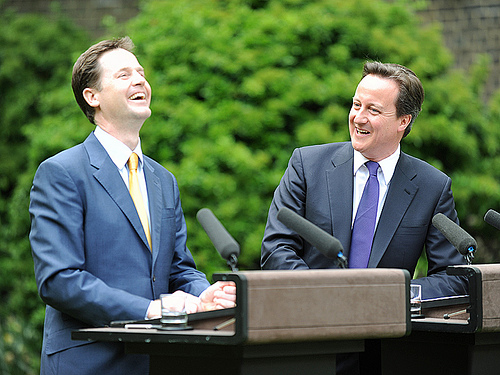
The Secretary for the Department of Energy and Climate Change (DECC), will be Chris Huhne, Lib Dem. He was environment spokesman for the party in 2006–2007.
In the coalition statement, the two parties have outlined their joint policy on climate change and renewable energy.
The programme on renewable energy and environment includes:
- The establishment of a smart grid and the roll-out of smart meters;
- The full establishment of feed-in tariff systems in electricity – as well as the maintenance of banded ROCs;
- Measure to promote an increase in energy-from-waste through anaerobic digestion;
- The creation of a green investment bank (which was also one of Labour’s policies);
- Measures to encourage marine energy; and
- Seek to increase the target for renewable energy subject to the advice of the Climate Change Committee.
Furthermore, the coalition will look at a floor price for carbon and to persuade the EU to move towards full auctioning of ETS permits, and to mandate a national recharging network for plug-in hybrid vehicles.
It will be interesting to see how these plans pan out in reality, as the Lib Dem policy briefing on Climate Change and Energy states, amongst other things: “We can’t trust the Conservatives: they talk about going green but many don’t even accept climate change science.”
Nuclear
The Liberal Democrats have long voiced their opposition to new nuclear, whereas the Conservatives are pro-nuclear. There was much speculation at how the two parties would (or could) agree on whether or not to promote new nuclear power in the UK.
The coalition statement states: “We have agreed a process that will allow Liberal Democrats to maintain their opposition to nuclear power while permitting the government to bring forward the national planning statement for ratification by Parliament so that new nuclear construction becomes possible.”
Basically, the Government will complete a draft of the national planning statement and put it before Parliament; a Lib Dem spokesperson will speak against the planning; Lib Dem MPs will abstain from voting.
Wind and marine renewable industry positive
Maria McCaffery, RenewableUK Chief Executive says: “They key now is to capitalise on our vast renewable energy potentials and on the progress which has already been made, in order to deliver green collar jobs, energy security and carbon emissions reductions.
“We are delighted that the agreement seeks to increase the target for energy from renewable sources, and are eagerly anticipating further details on the relationship between the renewables obligation and feed-in tariff mechanisms. This is essential in order to maintain investor confidence,” she adds.
“We are also pleased with how substantial the set of environmental policies is even at this early stage. During the life of this Parliament and according to the Agreement we could be looking at smart meters, the creation of a green investment bank and measures, to encourage marine energy, which are all initiatives fully endorsed by RenewableUK.”
Long term certainty for renewable energy
Guy Battle, Deloitte Sustainability Partner comments: “It is encouraging that the Lib-Con coalition has placed sustainability at the heart of the new Government agenda and has already made serious commitments to continuing to improve the UK’s environmental policy.
“In terms of policy, whilst the commitments are necessarily broad and without detail at this stage, initiatives that provide investors with long term certainty will allow the renewable industry to grow, smart metering to flourish, and carbon to be priced. Mandating a national recharging network for electric and plug-in hybrid vehicles and a green investment bank will also combine to form an integral part of the long term transition to a more sustainable economy,” he says.
“In particular feed-in tariffs have been notably successful in other parts of Europe in expediting investment in renewables relative to the UK’s ROC based approach. But an extension of feed-in tariffs to a significant part of the market for new generation renewable energy will require re-determining how competition is best organised more generally in the electricity sector.
“Overall this agenda will send the right message to the market that the environment remains at the very heart of the agenda for the coalition but would encourage policy formers to remember that in these cash restrained times they can only be delivered through the active engagement with business.”
What will the future bring?
Now it remains to see how these policies will pan out in real life. Will there be specific incentives per technology, or will a Conservative approach of letting the market decide prevail?
If you have thoughts on this, please leave a comment below.
